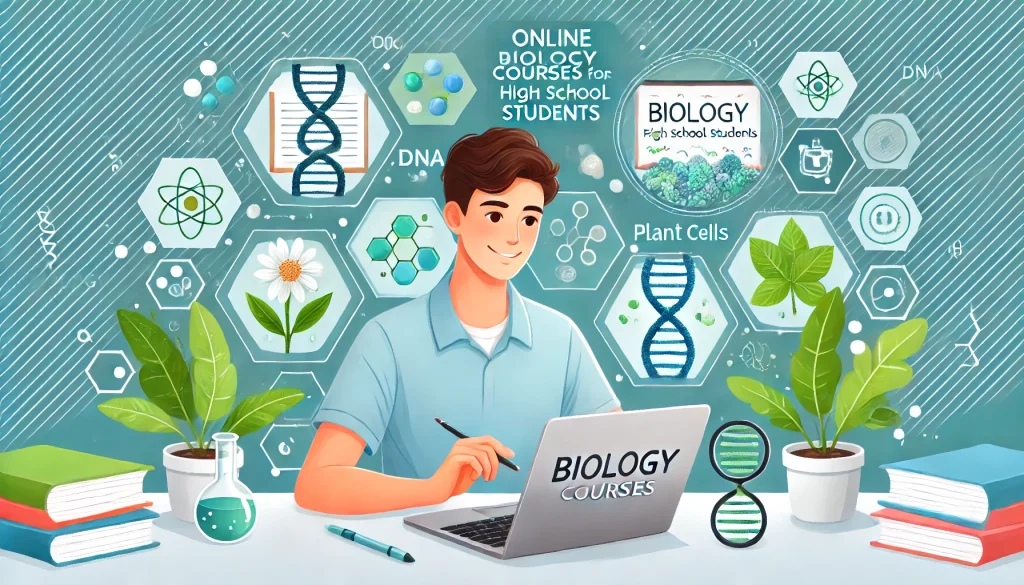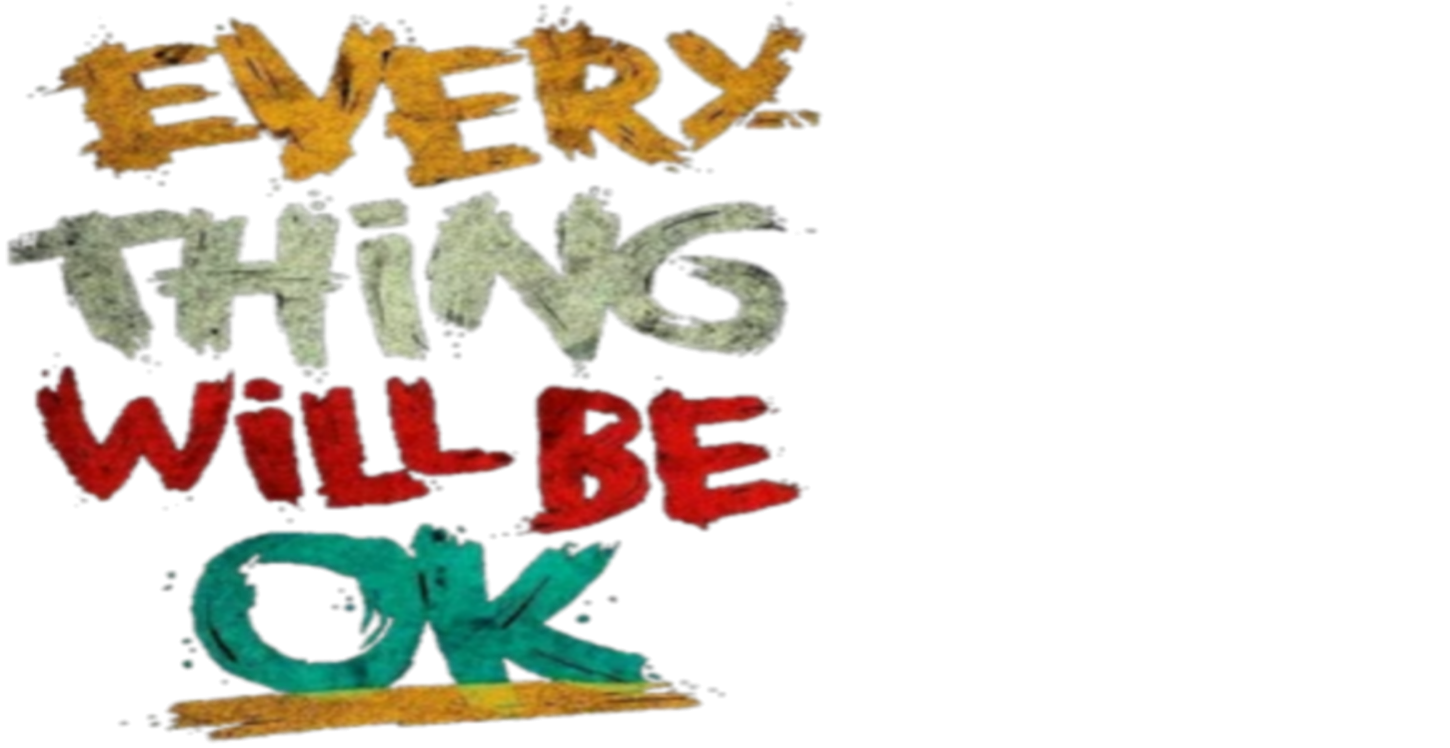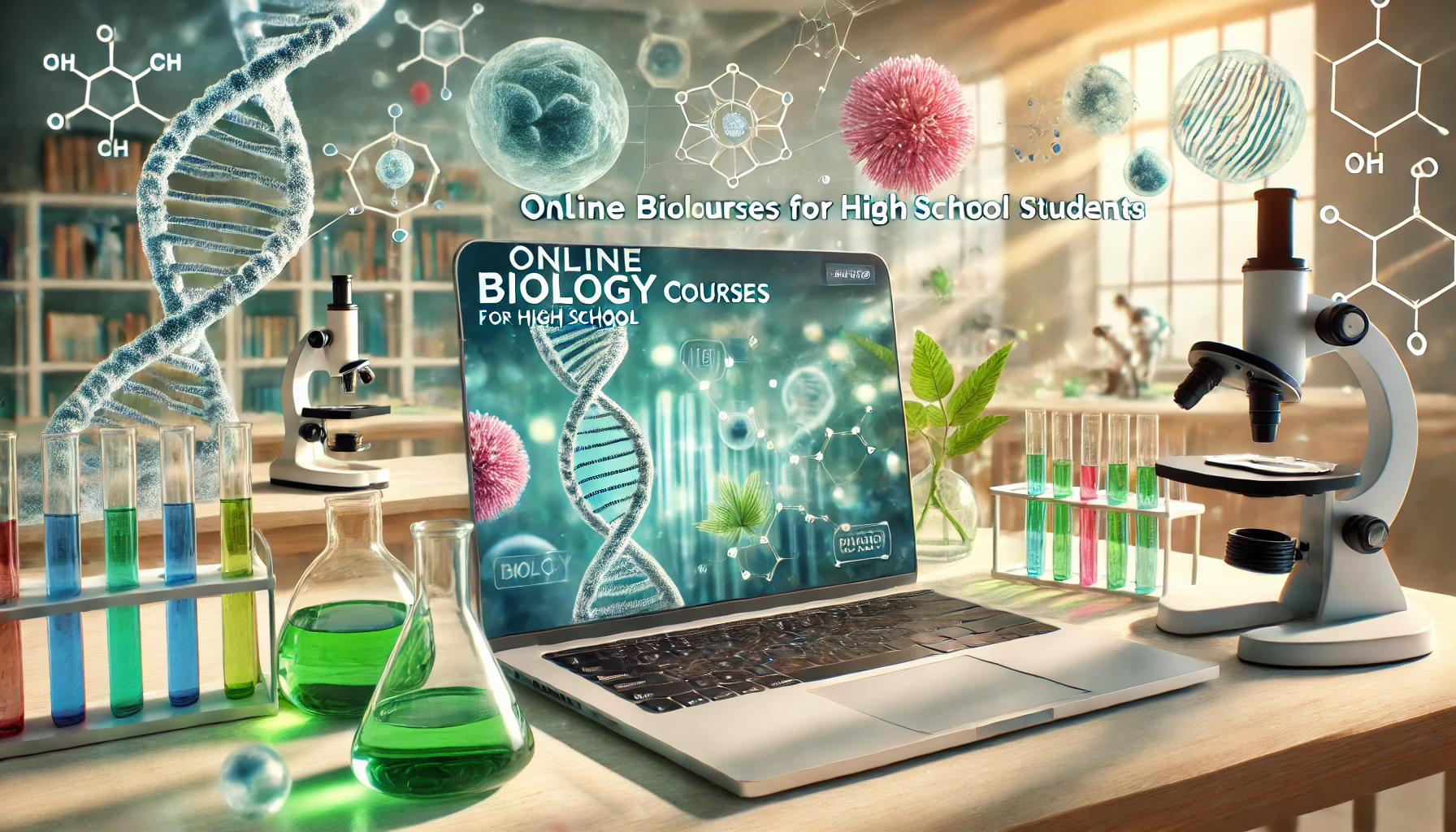Biology is a fascinating subject that helps us understand the world around us. For high school students, learning biology can open up a world of opportunities. In this article, we will explore some of the best free online biology courses for high school students. These courses are perfect for anyone who wants to learn more about biology without spending any money.
Why Study Biology Online?
Studying biology online has many benefits. First, it’s flexible. You can learn at your own pace and schedule. Second, it’s accessible. You can access these courses from anywhere with an internet connection. Finally, it’s often free, which makes it a great option for students on a budget.
What to Look for in a Free Online Biology Course
When choosing a free online biology course, there are a few things to consider:
- Content Quality: Make sure the course covers the topics you are interested in and is taught by qualified instructors.
- Interactive Elements: Look for courses that include videos, quizzes, and interactive activities to make learning more engaging.
- Certification: Some free courses offer a certificate of completion, which can be a great addition to your resume or college application.
Top Free Online Biology Courses
Here are some of the best free online biology courses for high school students:
- Khan Academy – High School Biology
Khan Academy offers a comprehensive high school biology course that covers topics such as cell biology, genetics, evolution, and ecology. The course includes video lectures, practice exercises, and quizzes to help reinforce your learning. - Coursera – Biology Everywhere
Coursera offers a free course called “Biology Everywhere,” which is designed to help high school students understand the basics of biology. The course is taught by professors from the University of Colorado Boulder and includes video lectures, quizzes, and assignments. - edX – AP Biology
edX offers a free AP Biology course that covers all the topics required for the AP Biology exam. The course is taught by instructors from top universities and includes video lectures, quizzes, and practice exams. - MIT OpenCourseWare – Introduction to Biology
MIT OpenCourseWare offers a free course called “Introduction to Biology,” which covers topics such as biochemistry, genetics, molecular biology, and cell biology. The course includes video lectures, assignments, and exams. - OpenStax – Biology 2e
OpenStax offers a free online textbook called “Biology 2e,” which is designed for high school and college students. The textbook covers all the major topics in biology and includes interactive elements such as videos and quizzes. - FutureLearn – Biochemistry: The Molecules of Life
FutureLearn offers a free course called “Biochemistry: The Molecules of Life,” which is designed to help high school students understand the basics of biochemistry. The course includes video lectures, quizzes, and interactive activities.
How to Get the Most Out of Your Online Biology Course
To get the most out of your online biology course, here are some tips:
- Set a Schedule: Set aside regular time each week to study. This will help you stay on track and make steady progress.
- Take Notes: Take notes while you study to help reinforce your learning and make it easier to review the material later.
- Participate in Discussions: Many online courses include discussion forums where you can ask questions and interact with other students. Participating in these discussions can help you deepen your understanding of the material.
- Do the Quizzes and Assignments: Make sure to complete all the quizzes and assignments. These are designed to help you reinforce your learning and check your understanding of the material.
Advantages of Free Online Biology Courses

Free online biology courses offer many advantages for high school students:
- No Cost: Since these courses are free, you can learn without worrying about the cost.
- High-Quality Education: Many of these courses are taught by professors from top universities and include high-quality content.
- Flexible Learning: You can study at your own pace and on your schedule, which makes it easy to fit learning into your busy life.
- Access to Resources: Many courses include additional resources such as textbooks, videos, and quizzes to help you learn.
Career Opportunities in Biology
Studying biology can lead to a wide range of exciting career opportunities. Here are some examples:
- Biomedical Scientist: Biomedical scientists conduct research to improve human health. They study diseases, develop new treatments, and work on medical innovations.
- Environmental Scientist: Environmental scientists study the natural world and work to protect the environment. They may work on issues such as climate change, pollution, and conservation.
- Genetic Counselor: Genetic counselors help individuals and families understand their genetic risks for certain diseases. They provide information and support to help people make informed decisions about their health.
- Marine Biologist: Marine biologists study the ocean and its inhabitants. They may work on issues such as marine conservation, fisheries management, and marine ecosystems.
- Microbiologist: Microbiologists study microorganisms such as bacteria, viruses, and fungi. They work on issues such as infectious diseases, food safety, and biotechnology.
READ MORE OPPORTUNITIES: Augmented Reality in Education | AR in Classrooms
Conclusion
In conclusion, free online biology courses are a great way for high school students to learn about biology without spending any money. These courses offer high-quality content, flexible learning options, and access to valuable resources. By taking advantage of these courses, you can deepen your understanding of biology and open up a world of exciting career opportunities.
Here are some final tips to help you succeed in your online biology course:
- Stay Motivated: Set goals for yourself and celebrate your progress. Remember why you started studying biology and keep that motivation alive.
- Seek Help When Needed: If you are struggling with a topic, don’t hesitate to seek help. Use the discussion forums, ask your teacher, or find additional resources to help you.
- Apply What You Learn: Try to apply what you learn in your everyday life. This will help you see the relevance of biology and make your learning more meaningful.
By following these tips and taking advantage of the best free online biology courses, you can succeed in your studies and prepare for a bright future in the field of biology. Happy learning!
For more information on free online biology courses, check out the links provided in this article and start your learning journey today!
Alternatives to Online Biology Courses for High School Students
While online biology courses offer a flexible and accessible way to learn, many other excellent alternatives can provide high school students with a solid foundation in biology. These alternatives range from traditional classroom settings to hands-on experiences and self-study options. Let’s explore some of the best alternatives to online biology courses.
1. Traditional Classroom Learning
Classroom Learning is a time-tested method of education. High school students can take biology classes as part of their standard curriculum. Here are some advantages:
- Structured Environment: The classroom provides a structured learning environment with a set schedule, which can help students stay disciplined.
- Access to Laboratory Facilities: Students have access to lab equipment and materials, allowing them to conduct experiments and learn through hands-on experience.
- Immediate Feedback: Teachers can provide immediate feedback and personalized support to help students understand complex topics.
- Peer Interaction: Interacting with classmates can enhance learning through group discussions and collaborative projects.
For more details on traditional classroom learning, visit Public School Review.
2. Private Tutoring
Private Tutoring offers personalized instruction tailored to the student’s specific needs. Benefits include:
- Customized Learning Plans: Tutors can create customized lesson plans that focus on the student’s strengths and areas for improvement.
- Flexible Scheduling: Sessions can be scheduled at convenient times, making it easier to fit into a busy schedule.
- One-on-One Attention: Tutors provide individualized attention, ensuring that students fully grasp the material.
- Targeted Support: Tutors can help with specific topics, homework, and test preparation.
For more details on private tutoring, visit Wyzant.
3. Study Groups
Study Groups are a great way for students to learn collaboratively. Advantages include:
- Peer Learning: Students can learn from each other by explaining concepts and solving problems together.
- Motivation and Accountability: Study groups can help keep students motivated and accountable for their learning.
- Diverse Perspectives: Group members can offer different perspectives and approaches to understanding biology topics.
- Social Interaction: Working in a group can make learning more enjoyable and less isolating.
For more details on study groups, visit Education Corner.
4. Summer Camps and Workshops
Summer Camps and Workshops offer immersive learning experiences. Benefits include:
- Intensive Learning: Camps and workshops provide intensive, focused instruction over a short period.
- Hands-On Activities: These programs often include hands-on activities and experiments, enhancing understanding through practical experience.
- Exposure to Experts: Students can learn from professionals and experts in the field of biology.
- Networking Opportunities: Camps and workshops provide opportunities to meet other students with similar interests.
For more details on summer camps and workshops, visit National Youth Science Foundation.
5. Science Museums and Nature Centers
Science Museums and Nature Centers offer educational programs and exhibits. Advantages include:
- Interactive Exhibits: Museums and nature centers often have interactive exhibits that make learning fun and engaging.
- Educational Programs: Many offer educational programs, workshops, and guided tours that focus on various biology topics.
- Real-World Applications: Students can see real-world applications of biological concepts and learn about current research and discoveries.
- Field Trips: Visiting these centers can be a great field trip experience, providing a break from the traditional classroom setting.
For more details on science museums and nature centers, visit Smithsonian Science Education Center.
6. Textbooks and Self-Study Materials
Textbooks and Self-Study Materials allow students to learn at their own pace. Benefits include:
- Comprehensive Coverage: High-quality textbooks cover all the essential topics in biology.
- Flexibility: Students can study whenever they have time, making it easy to fit learning into their schedule.
- Self-Paced Learning: Students can spend more time on challenging topics and move quickly through material they understand well.
- Supplemental Resources: Many textbooks come with supplemental resources such as practice questions, quizzes, and online content.
For more details on textbooks and self-study materials, visit OpenStax Biology 2e.
7. Educational TV Programs and Documentaries
Educational TV Programs and Documentaries are an engaging way to learn about biology. Benefits include:
- Visual Learning: Visual content can make complex topics easier to understand.
- High-Quality Content: Many programs and documentaries are produced by experts and offer high-quality, accurate information.
- Inspiration and Interest: Watching real-world applications of biology can inspire students and spark their interest in the subject.
- Accessibility: Many programs are available on TV, streaming services, or educational websites, making them easily accessible.
For more details on educational TV programs and documentaries, visit PBS LearningMedia.
8. Community Science Projects and Volunteering
Community Science Projects and Volunteering offer hands-on, real-world experience. Benefits include:
- Practical Experience: Students can apply what they have learned in a real-world setting.
- Community Engagement: Participating in community projects helps students engage with their community and understand the impact of science on society.
- Skill Development: Students can develop valuable skills such as teamwork, problem-solving, and critical thinking.
- Career Exploration: Volunteering in biology-related fields can help students explore potential career paths.
For more details on community science projects and volunteering, visit Citizen Science.
Conclusion
While online biology courses are a fantastic resource, there are many other alternatives that high school students can explore to deepen their understanding of biology. Whether it’s through traditional classroom learning, private tutoring, study groups, summer camps, science museums, self-study materials, educational TV programs, or community science projects, students have a wealth of options to choose from. Each alternative offers unique benefits that can complement and enhance a student’s educational journey in biology. By exploring these alternatives, students can find the best learning methods that suit their individual needs and preferences.

